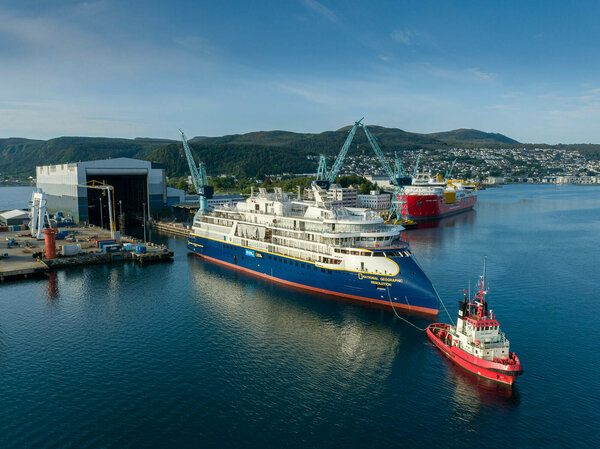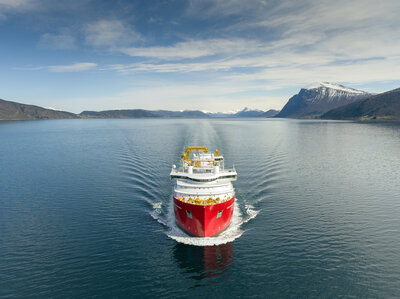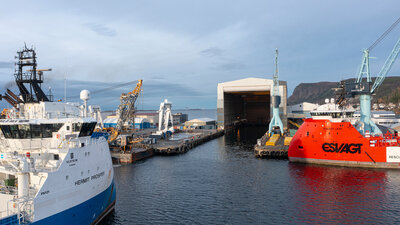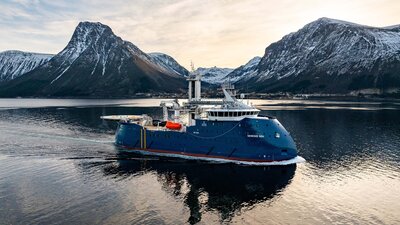The three nominated vessels are 'National Geographic Resolution', 'Nexans Aurora', and 'Hydra', the latter under construction at the Westcon yard.
You can vote for your favourite here,
and see the poll results afterwards, but the final decision by the jury will be made on a professional basis and independent of the voting results.
NATIONAL GEOGRAPHIC RESOLUTION
The polar vessel is named after Captain Cook's favourite ship, but the 2021 version of the 'Resolution' is a state-of-the-art and safe platform for polar exploration. She is purpose-built for polar navigation.
The ship holds the class notation Polar Class 5 (PC5) for polar voyages, and together with the sister ship, the National Geographic Endurance, these vessels are the only cruise ships with such a high polar class. The ships are designed to navigate polar areas year-round, and can safely explore new areas. This enables Lindblad Expeditions to start their polar travels up to two weeks ahead of the other expedition cruise vessels. The ship's expanded fuel and water tanks provide for extended operations in remote areas, while the zero-speed stabilizers contribute to increased comfort at zero speed when stopped for wildlife observation or embarking/disembarking the ship.
The ship is based on the CX104 design from Ulstein Design & Solutions AS. A core feature is ULSTEIN's X-BOW® solution, a distinctive bow that provides fuel efficiency and gives a smoother ride with softer motions in head seas. The X-BOW design feature has been proven on more than 100 offshore vessels, operating in rough conditions. Recently, the bow solution was introduced in the cruise segment, and this industry finds the bow highly attractive.
The bow area of a cruise vessel is often a gathering place in the early morning. This is where you can stand to look at whales, penguins and dolphins. The Lindblad vessels have a very different kind of bow. Being on a ship with a traditional bow you will have to lean over the side of the ship and look back down towards the waterline. On these vessels, due to the X-BOW, you'll be able to look straight down into the water. And this is quite a magnificent way of viewing wildlife in the sea.
The Covid-19 pandemic set a halt to the cruise industry, but the expedition cruise companies have now reactivated the travel activity. Having vessels with a moderate number of passengers, in combination with large public spaces, is a winning combination in these times. On the National Geographic Resolution, there is plenty of room for 126 passengers. The comfort is exceptional. The vessel holds 69 outside-facing cabins, most of which will feature balconies with floor-to-ceiling sliding doors that bring in spectacular views and ample natural light. The ship will carry a full suite of expedition tools and offer a variety of experience-enhancing amenities.
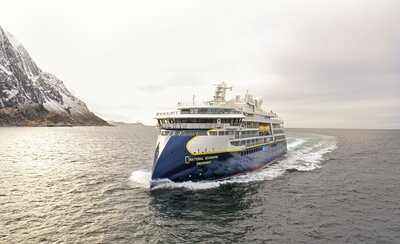
NEXANS AURORA
The cable-laying vessel Nexans Aurora has been very visibly present at Ulstein Verft during the construction period. The 149.9-metre long and 31-metre wide vessel is designed by Skipsteknisk and has a cable capacity of 10,000 tonnes.
Despite the Covid-19 pandemic, the project progress has been steady, and the ship was delivered on time on 31 May 2021, three years after the shipbuilding contract was signed. The next milestones have been a modest, Corona-sized naming ceremony on 8 June, and on Sunday 13 June, the vessel finally left Ulstein Verft for the next step in her process, to get finalised for her first offshore wind operations. The ship is specialized in the transport and installation of subsea high voltage cable systems and a variety of subsea construction tasks. Nexans Aurora is equipped with purpose-designed equipment for cable and umbilical transport and laying, including bundle laying, protection and jointing.
The vessel will play a vital role in Nexans' turn-key supply of advanced subsea high voltage systems to support the electrification of the world, including providing vital connections between countries and regions, offshore renewable solutions as well as electrification solutions for other offshore installations. When the ship comes into operation, she will, among other things, will lay export cables for offshore wind farms and interconnectors around the world like for the Seagreen OWF in Scotland, the Crete-Attica interconnector in Greece and the Empire Offshore Wind project in the U.S.
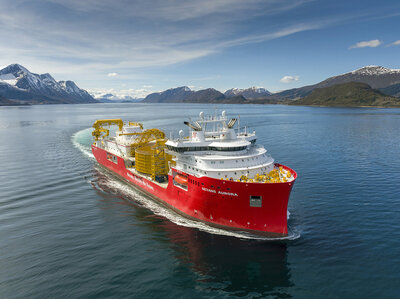
The jury
The jury is composed of Sverre Steen, who is professor and Head of the Department of Marine Engineering, Lars Gørvell-Dahll who is industry manager in the Maritime Industry Association in Norwegian Industry / NHO, and Gustav Erik Blaalid who is editor in chief of Skipsrevyen and also the leader of the jury.
